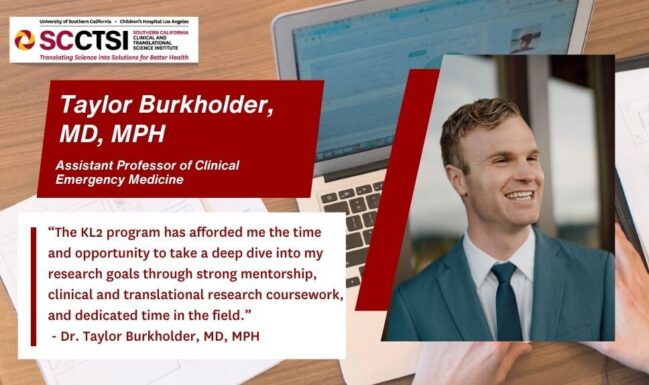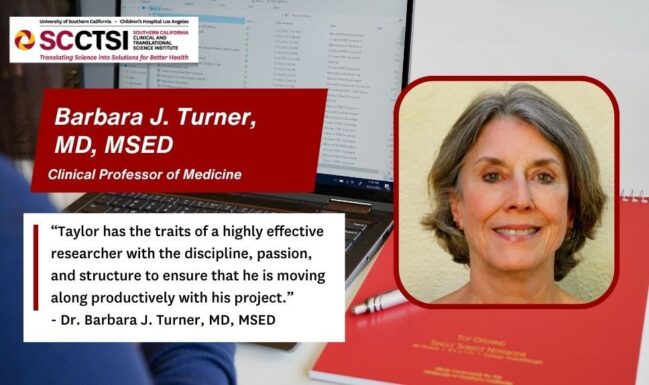Interview with Taylor Burkholder, MD, MPH, KL2 award recipient
A recipient of the SC CTSI Mentored Career Development in Clinical and Translational Science award
We sat down with Dr. Taylor Burkholder, a recipient of the SC CTSI Mentored Career Development in Clinical and Translational Science award, to hear about his experience as a KL2 scholar and how he has furthered his professional goals. We look forward to seeing all he will accomplish in the coming years.
Tell us a little bit about your experience so far in the KL2 program.
In the first year, the KL2 program has afforded me the time and opportunity to take a deep dive into my research goals through strong mentorship, the longitudinal clinical and translational research coursework, and dedicated time in the field working on an implementation science-based research project in Zambia to strengthen emergency care.
How did you first learn about the program?
I learned about the KL2 program through two of my colleagues in the Department of Emergency Medicine. One of my colleagues is an alumna of the program and another had just begun the program. I was encouraged to apply by my Chair.
What initially got you interested in starting this program?
As a junior researcher, my vision for the research I wanted to conduct was becoming clearer, but that also highlighted the gaps in my research knowledge and skills (particularly focusing on the clinical implementation phase of translational research). The KL2 program promises to develop the skills that will help me close those gaps and become an independent researcher with a strong methodological foundation.

Tell us about your own background as a researcher and Emergency Medicine.
After residency training, I completed a fellowship in Global Emergency Care at the University of Colorado that was equal parts policy at the World Health Organization and research in various low- and middle-income countries.
What drove you to specialize in this?
It is estimated that almost 90% of deaths in low- and middle-income countries could be addressed by high quality emergency care systems, yet the majority of the world lacks access to even the most basic forms of emergency care. Working to expand access to quality emergency care feels worthwhile, not only for the future lives saved but also to protect a fundamental human right and reduce global health inequities. It’s also a fascinating challenge given the limited resources, difficulty obtaining good data, and various cultural and political contexts.
What do you think that others can gain from this program?
Junior researchers who wish to augment their research skills, expand their mentorship, and find dedicated time to build a research portfolio that will also strengthen their future funding applications should consider this as an opportunity to accelerate their progress.
Have you run into any challenges or obstacles along the way?
Absolutely. Conducting research from the opposite side of the world, even with a brilliant team of in-country collaborators, has many challenges. One of them is blazing the trail on how to seek approval for and finance research abroad, while in the KL2 program which (to my knowledge) hasn’t been done before. Thankfully, the program and my mentors have been supportive along the way.
What has been the most rewarding part of being a part of the KL2 program?
Seeing the progress that can be made when you have dedicated time to focus on a project and mentorship to hold you accountable and guide you through the challenges that arise.
What does the KL2 program mean to you and how has it furthered your career?
Although I’m only one-third of the way through the program, I can tell that this program has accelerated my career development by many years, and I feel confident in my ability to apply for sustainable funding before the end of the program.
Who else has been an integral part of your success in this program?
My mentors, the program leadership, my Chair’s support, my KL2 cohort/classmates, the CTR course series instructors, and of course my collaborators in Zambia.

Dr. Barbara Turner is Dr. Burkholder’s mentor. We asked Dr. Turner, what has been your experience as a mentor to Dr. Burkholder?
Taylor Burkholder brings a unique perspective to his research, combining expertise in emergency medicine with substantial experience with conducting research in Africa. His collaboration with the World Health Organization is significant because it potentially allows him to have a broad impact even beyond the African country where he is conducting his current project. As his mentor in implementation science, he has been a delight to work with because of his quick grasp of the fundamentals of this type of research and his willingness to enroll in a variety of educational programs to learn how to do implementation with rigor. Taylor has the traits of a highly effective researcher with the discipline, passion, and structure to ensure that he is moving along productively with his project. It’s even more impressive that he’s able to manage a project halfway around the world; this has been facilitated by his other excellent KL2 mentors who have substantial expertise in conducting global research projects. As a mentor, I enjoy working with Taylor but I also appreciate partnering with his other mentors and the KL2 mentorship team in general.



